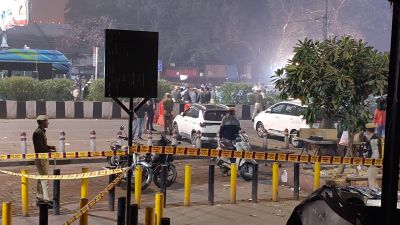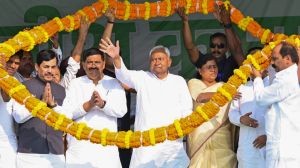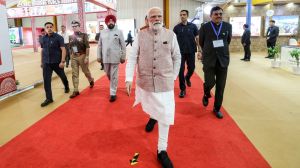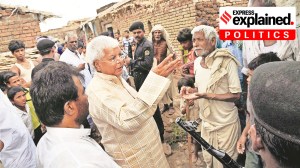Mistakes yes, but we never divided people, says Sonia
On the closing day of the campaign for the third phase of poll in Bihar, Sonia Gandhi kept her date with Araria with a punctual touchdown ju...

On the closing day of the campaign for the third phase of poll in Bihar, Sonia Gandhi kept her date with Araria with a punctual touchdown just 10 minutes past the appointed time of 11 am. She mentioned Laloo Prasad Yadav, but once in her speech and the RJD not at all—clubbing it with other allies in the overarching euphemism of ‘‘hamari sahyogi partiyan’’.
The Congress chief’s address was replete with references to laws enacted by the UPA in Parliament. She spoke of the Rural Employment Guarantee Scheme and the Right to Information. But as she addressed the crowd in this Muslim-dominated district, her main thrust was unmistakable: Vote UPA in the name of secularism. Only the UPA can keep the ‘‘communal forces’’ at bay. ‘‘The Congress may have made mistakes,’’ she said, ‘‘but one thing this party has never done is spread disaffection between communities.’’
It is a fair surmise that the crowd that heard her out patiently at Gorhi Chowk, on the left side of Purnea-Forbisganj NH-57, turned a deaf ear to her advocacy of her party.
In Araria, they don’t think much of parties. This constituency changes parties with each successive election, plumping for independents in between, and even flirting with no-hoper parties like Anand Mohan’s erstwhile BPP or Syed Shahabuddin’s Insaaf Party. Consider this: The BJP won the last election in Araria, scraping through due to a division in Muslim votes, an independent candidate won in 2000, the BPP in 1995, an independent in 1990 and the Congress in 1985.
Political discussions here feature the relative merits and demerits of local candidates. The onus of addressing Araria’s issues is on the candidates. The issues here, even more than in rest of Bihar, centre on the needs of road, electricity, water, education and employment.
This district ranks second from the bottom in the country in terms of literacy. It is annually ravaged by floods. It is rich in jute production but has no jute industry. The hospital in Araria town lacks a toilet for the patients but that is the least of their worries because it lacks medicines as well. In many villages, like those that fall in Raniganj constituency, there is no electricity at all. Raniganj is a particularly poignant example. This reserved constituency has been represented by a minister in the state government for all of the last 15 years and yet its villages live in complete unrelieved darkness.
About 35 km from Raniganj is Jokihat. This has been the constituency of Mohammed Taslimuddin, who sat on the podium while Sonia Gandhi addressed the crowd. That is not his only calling card, of course. Everyone here knows ‘‘Taslim sahib’’. He is Union Minister of State and RJD strongman, more newsworthy in national politics for belonging to Manmohan Singh’s set of ‘‘tainted ministers’’. He has many criminal cases pending against him, and had to step down from the Deve Gowda’s cabinet for that reason once.
In Araria district, and particularly in Jokihat where his village lies, there is marvelous lore about how he rose from extremely humble origins—he lost his father young and his mother, still alive at 108, sold eggs to raise him—to become ‘‘Seemanchal’s Gandhi’’ for some, a ‘‘bahubali’’ for others. Taslim Sahib has dominated the politics of this region for decades. But the February poll saw a major upset: Taslimuddin’s son Sarfaraz Alam, who also has criminal cases pending against him and who is currently lodged in the Kishanganj jail, lost by about 25,000 votes.
At Sisona in Jokihat, in the most flamboyant building of the cluster of three houses owned by the Family Taslimuddin, the younger son, Shahnawaz, brags: ‘‘My father has been MLA since 1969. He will get the vote, no matter which party he contests from, except the BJP. My father is known all over the Seemanchal area—Araria, Purnea, Kishanganj, Katihar, Saharsa, Madhepura.’’ Wadood Alam, seated next to him, and his cousin, pitches in: ‘‘You ask who is a bahubali? He is one who has the people’s support, who is grounded, who is attached to the people.”
But a little distance from Taslimuddin’s houses, at Thaingapur chowk, you talk politics and an angry crowd gathers. Men and women speak of the unkept promises—they mention Antyodaya Annapoorna and Indira Awas Yojana. These are schemes that exist only on paper. The crowd also speaks of terror tactics to subdue to them, of henchmen sent to beat up those who dare to raise their voice in protest. They sound more angry than fearful.
It’s a tough contest this time in Jokihat and in entire Araria. Patna is a faraway place and the political party doesn’t really matter here. But each and every candidate in the fray knows that the voter is seething.





- 01
- 02
- 03
- 04
- 05


























